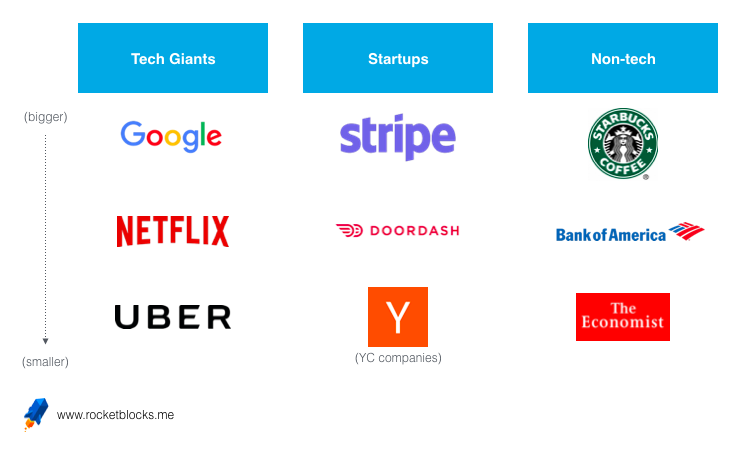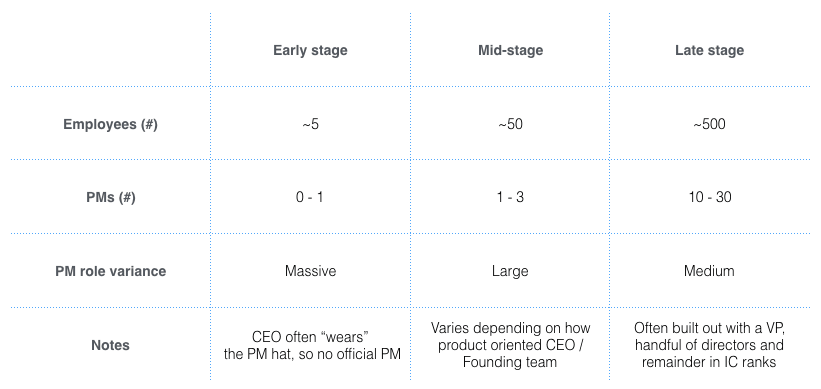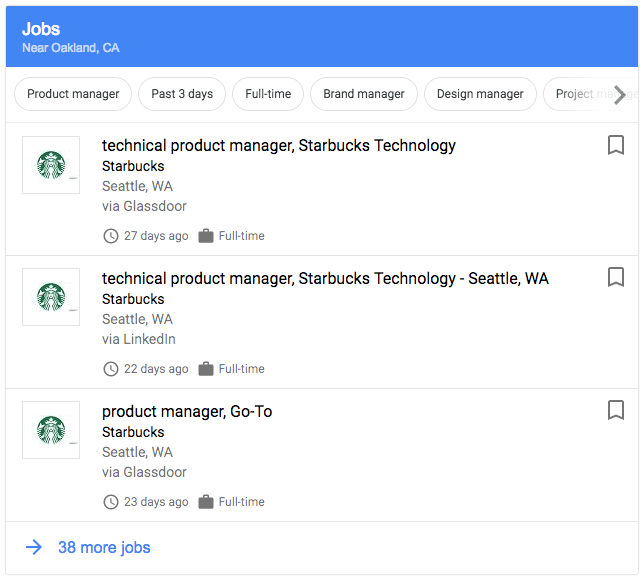Which types of companies hire product managers?
|
|
|
Google. Facebook. Amazon. Those are the obvious answers.
And yet, while those companies have thousands of PMs, it's only a fraction of the whole story.
Demand for PMs is growing and diversifying
Increasingly, non-tech companies (e.g., companies who gained scale prior to the ubiquity of software and internet availability) are hiring PMs to help them make the transition into a software-centric world.
Ultimately, this is a defining trend that will have a profound effect in the next two decades: every company will integrate software into their business models to survive. To do so, these companies will need a collective army of PMs to manage that process.
Types of companies that hire PMs
You can think of the groupings of companies which hire PMs in three main categories:
- Tech giants: Google, Amazon, Facebook, etc.
- Startups: Stripe, DoorDash, etc.
- Non-tech: Starbucks, Bank of America, etc.

Tech giants
The Mega Giants: Google, Facebook, Amazon, Microsoft
Each of these companies has hundreds, if not thousands of different products offered, and they staff PMs against most of them to manage them.
Additionally, large tech companies often run PM training programs that hire fresh undergrads (and sometimes grad students). The defining program is Google's Associate Product Management (APM) program that Marissa Mayer started, but other leaders have followed suit: like Facebook's Rotational Product Manager Program or Uber's APM program.
Mini-giants: Uber, Netflix, Salesforce, Didi, Airbnb et al
While Google, Amazon and Facebook employ thousands of PMs, they aren't the only game in town. A crop of exciting, fast growing deca-corns (private companies valued at over $10B), like Uber, Airbnb, WeWork, Didi and smaller public tech companies et all, hire large ranks of PMs as well.
Key benefits of a giant PM job:
- Established training programs and product processes to learn from
- Great opportunity to build a network of fellow PMs that leads to future learnings and job opportunities
- Chance to work on technology which, literally, impacts billions (or at least hundreds of millions) of users globally
💡 Got a PM interview? Our PM interview drills help get you in top form
Startups
Startups of all stripes hire PMs.
Warning! While startups hire PMs, this category of PM job is the most variable from company to company and, as a result, can be difficult to navigate.
Why? Well, startups are, by their very nature, young, fast-evolving and unstable businesses. Even though a startup might have traction, the company is typically focused on doing whatever it must do to survive day to day. As a result, the PM role, which already varies quite a bit even at established companies, varies dramatically from startup to startup.
Put another way: the variance of PM roles is inversely related to the size of the company.

Key factors leading to startup PM role variance
CEO as PM
In early stage startups, the CEO often acts as the PM. This drives variance in how the role evolves and dictates how long the company waits to hire the first "official" PM. As startups mature and the PM organization grows, the outsized CEO influence tends to wane but this can cause lots of variability, especially when the PM corps is still small.
Spectre of death
Since startups are often in "survival mode," this all hands on deck status means PMs (and others) might find themselves doing tasks outside the typical description. However, given the natural variation in the PM role, a plethora of assorted tasks fall onto the PM's plate. The more established and stable a startup becomes, the less this should happen.
Variable cross-functional staffing
In many startups and product teams, the full complement of counter parts to a PM might not exist (e.g., no PMM or no data analyst), which means a PMs likely will take on additional responsibilities. In lots of cases, it will mean some tasks just go un-done but critical ones which don't have a principal owner often fall to the PM.
Key benefits of a startup PM job:
- Unstructured environments provide lots of opportunity to take on new challenges
- If you perform well and/or if the company does well, you could find yourself moving up the PM / company ranks very quickly
- Typically get to move fast and ship product since a startup doesn't have the luxury of time and/or a large balance sheet
Non-tech companies
This is the new frontier of PM jobs.
Five years ago, leading companies outside of the technology sector, like Starbucks and Walmart, barely hired product managers. But today, that's changed significantly.
Today, these companies employ ranks of PMs to help imbue software into the core of their products (e.g., Walmart's mobile payment functionality or Starbucks' order-ahead capabilities.)

Software plus physical assets
Many of the traditional companies offer PM roles that get to combine significant physical assets of the company (e.g., thousands of retail stores like Starbucks or a massive, varied customer base like JP Morgan Chase) with the potential improvements that software can bring to their business.
For example, if you've ever used Starbucks "order-ahead" functionality or deposited a check via your mobile phone, you've used incredible technology built by PMs at companies that aren't native technology companies. Large, established industry players often bring tremendous assets to the table and great opportunities for PMs to enhance them with technology.
Key benefits of a non-tech company PM job:
- Chance to leverage massive asset base of an established company
- Opportunity to help trailblaze and transform the business for the future decades
- Well placed for advancement if the shift to a software-enabled business succeeds
Summary
The good news: if you're interested in a career in product management, you have lots of choices.
The obvious ones like Google, Amazon and Facebook provide great training grounds. However, they aren't the only game in town: growing tech companies, startups and non-tech companies re-orienting their businesses around software will provide lots of options.
P.S. Are you preparing for PM interviews?
Real interview questions. Sample answers from PM leaders at Google, Amazon and Facebook. Plus study sheets on key concepts.




